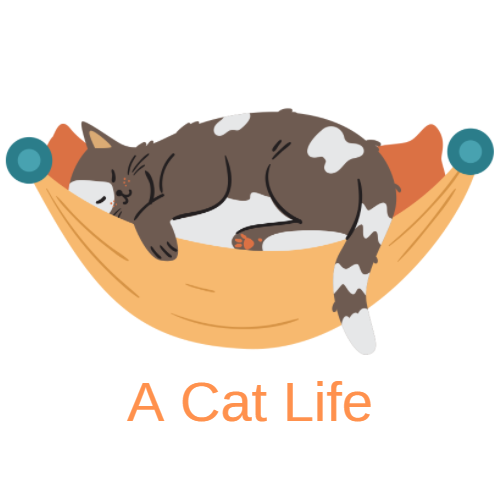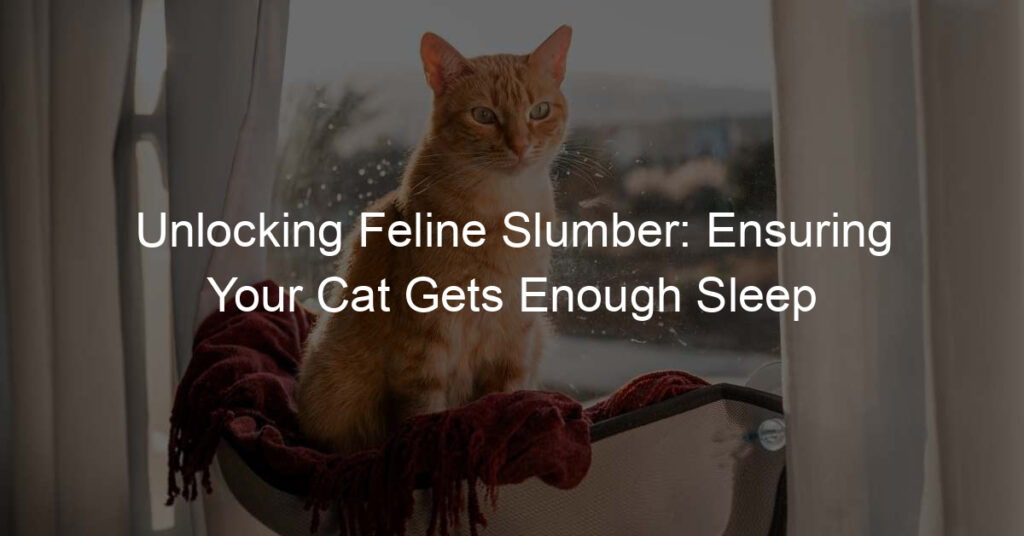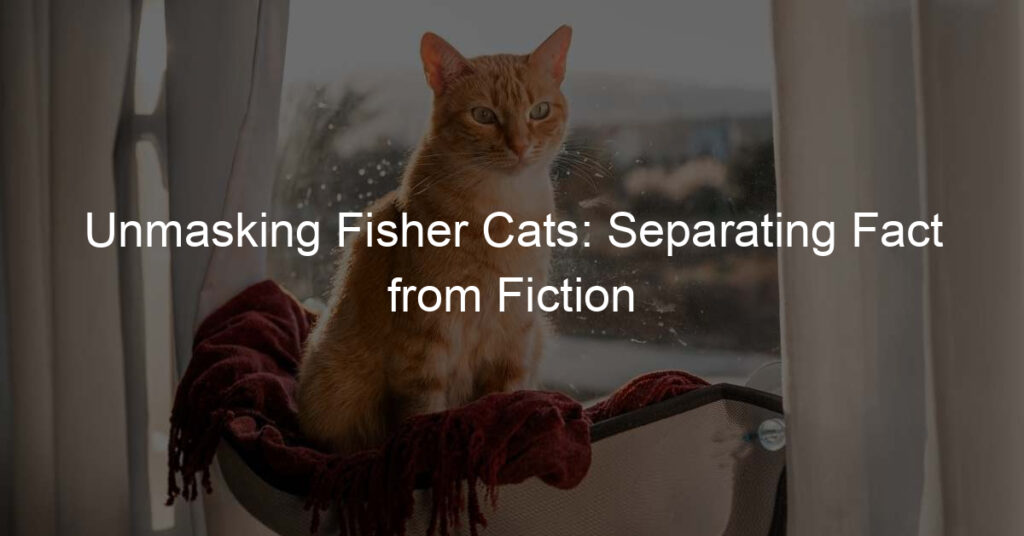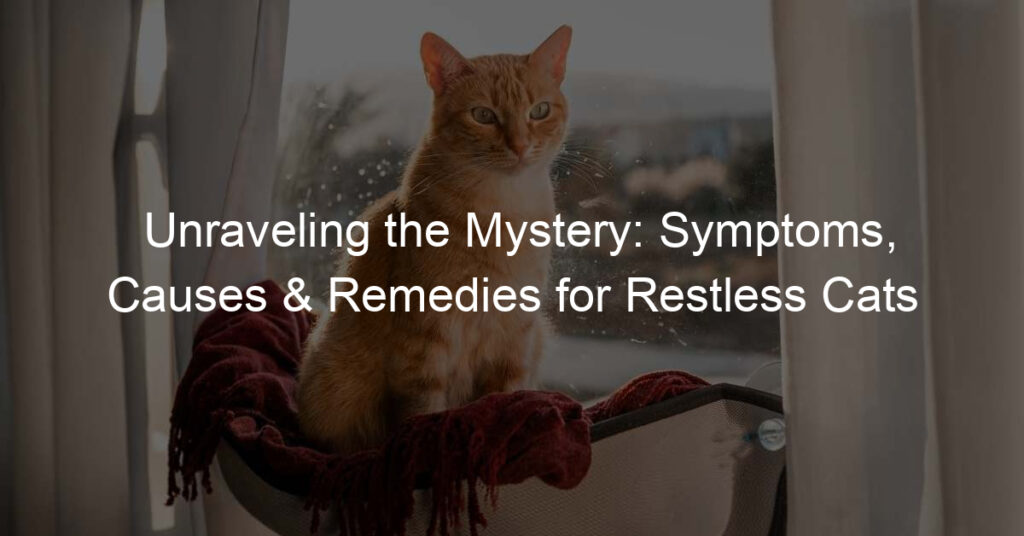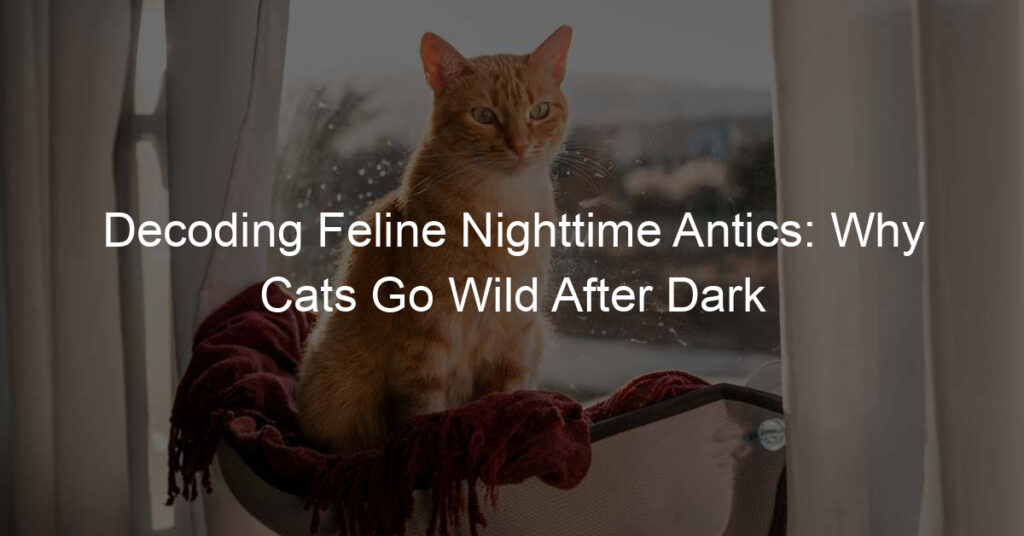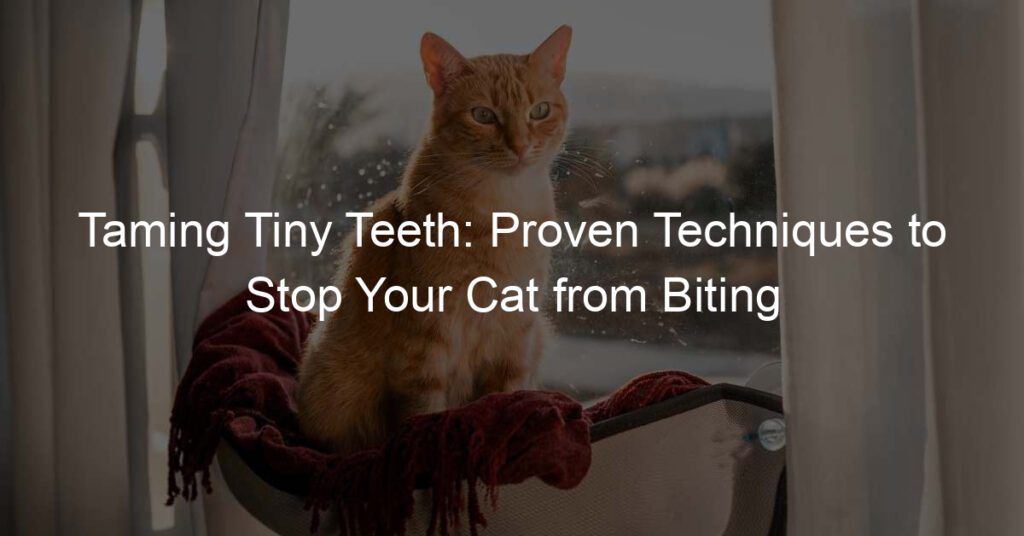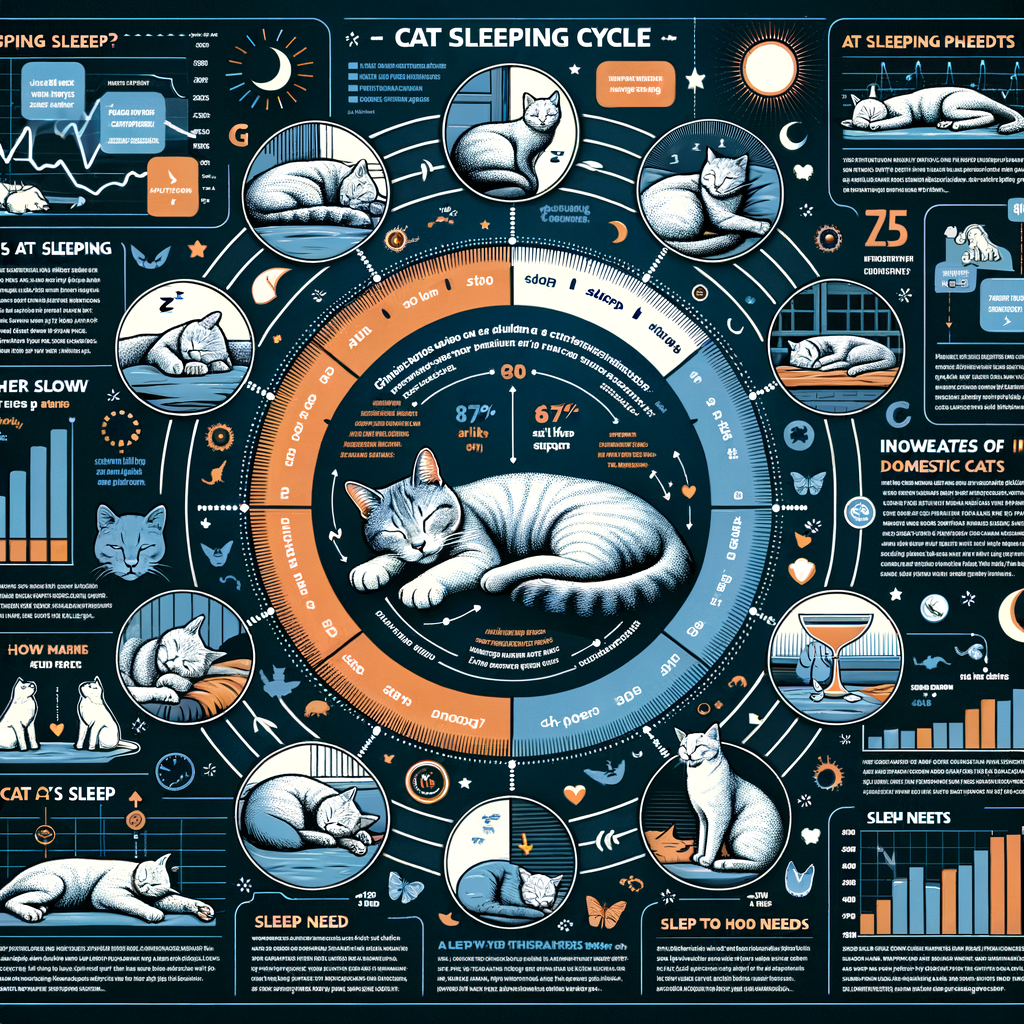
Introduction to Cat Sleep Requirements
Just like humans, cats also require a good amount of sleep to maintain their health and wellbeing. In this section, we will delve into the importance of sleep for cats and provide an overview of their sleep patterns.
- Understanding the Importance of Sleep for Cats
- Overview of Cat Sleep Patterns
Sleep plays a crucial role in the life of a cat. It is during sleep that their bodies repair and rejuvenate themselves. Cats, especially kittens, spend a significant portion of their day sleeping. This is because growth hormones are released during sleep, which is essential for their development.
Moreover, sleep helps in the proper functioning of a cat’s immune system. A well-rested cat is more likely to have a stronger immune system, which can fight off diseases and infections more effectively. Therefore, ensuring that your cat gets enough sleep is vital for its overall health and wellbeing.
Cats have unique sleep patterns that are different from humans. They are crepuscular animals, which means they are most active during dawn and dusk. Therefore, cats tend to sleep during the day and become active in the early morning and late evening.
On average, a cat sleeps for about 13 to 14 hours a day. However, this can vary depending on the cat’s age, health, and lifestyle. Kittens and older cats tend to sleep more than young and adult cats.
It’s also important to note that cats experience both deep and light sleep. During deep sleep, cats usually curl up and close their eyes tightly. On the other hand, during light sleep, they might appear to be sleeping with their eyes half-open and can wake up immediately if needed.
In the following sections, we will delve deeper into understanding cat sleep, cat sleep health, and ways to improve your cat’s sleep quality. By the end, you will have a comprehensive understanding of ensuring enough sleep for your cat.
Understanding Cat Sleep
Understanding the sleep patterns of your feline friend can be a fascinating endeavor. Cats, being the unique creatures they are, have sleep habits that are quite different from ours. In this section, we will decode these patterns to help you better understand your cat’s sleep needs.
Decoding Cat Sleep Patterns
Let’s delve into the specifics of cat sleep patterns, focusing on two key aspects: the amount of sleep cats need and the difference between their daytime and nighttime sleep.
- How much sleep do cats need?
- Daytime sleep vs nighttime sleep
Cats are known for their love of sleep. On average, a cat sleeps for about 13 to 14 hours a day. However, this can vary depending on their age and health. Kittens and older cats tend to sleep more than young and adult cats. This is because sleep aids growth in kittens and helps conserve energy in older cats.
Cats are crepuscular animals, which means they are most active during the dawn and dusk hours. Therefore, they tend to sleep more during the day and less at night. This pattern is a remnant of their wild ancestry, where hunting during these hours was most advantageous. However, cats can adjust their sleep schedule to match that of their human companions to some extent.
In conclusion, understanding your cat’s sleep patterns can help you ensure they are getting the rest they need. Remember, a well-rested cat is a happy and healthy cat!
Importance of Sleep for Cats
Sleep is not just a luxury for cats, it’s a necessity. It plays a crucial role in their overall health and well-being. Let’s delve into the importance of sleep for our feline friends.
- Health Benefits of Sleep for Cats
- Energy Restoration: Sleep allows cats to restore their energy levels. This is particularly important for kittens and young cats that are more active and expend more energy.
- Improved Immunity: Sleep helps bolster the immune system of cats, making them less susceptible to illnesses.
- Enhanced Growth: Growth hormones are released during sleep, which is crucial for the development of kittens.
- Better Mood: Adequate sleep can also improve a cat’s mood and behavior, making them more playful and interactive.
- Effects of Sleep Deprivation in Cats
- Increased Stress: Lack of sleep can lead to increased stress and anxiety in cats, which can affect their overall health and behavior.
- Lowered Immunity: Sleep deprivation can weaken a cat’s immune system, making them more prone to sickness.
- Behavioral Issues: Cats that don’t get enough sleep may exhibit behavioral issues such as aggression or hyperactivity.
- Decreased Alertness: Cats that are sleep-deprived may have decreased alertness and slower reaction times, which can lead to accidents or injuries.
Just like humans, cats also reap numerous health benefits from a good night’s sleep. Here are a few key benefits:
Just as there are benefits to getting enough sleep, there are also negative effects when cats don’t get the sleep they need. Here are some potential consequences of sleep deprivation in cats:
In conclusion, ensuring that your cat gets enough sleep is an essential part of maintaining their health and happiness. So, make sure your feline friend has a comfortable and quiet place to rest and sleep.
Cat Sleep Health
Understanding your cat’s sleep health is crucial for their overall well-being. In this section, we will discuss the signs of healthy cat sleep, including normal sleep behaviors and how to tell if your cat is getting enough sleep.
Signs of Healthy Cat Sleep
Just like humans, cats have specific sleep patterns and behaviors that indicate they are getting a good night’s rest. Let’s explore these signs in detail.
- Normal Sleep Behaviors in Cats
- How to Tell if Your Cat is Getting Enough Sleep
Cats are known for their love of sleep. On average, a healthy cat may sleep for 13 to 14 hours a day. During this time, you may notice your cat switching between light and deep sleep. In light sleep, your cat might twitch their ears or paws, which is completely normal. In deep sleep, your cat will be still and quiet. Some cats might even snore, which is also a sign of healthy sleep unless it’s excessively loud or accompanied by difficulty breathing.
Knowing if your cat is getting enough sleep involves observing their behavior when they are awake. A well-rested cat will be alert and active during their waking hours. They will show interest in their surroundings, play, and interact with you. On the other hand, a cat that is not getting enough sleep might be lethargic, uninterested in play, or show signs of irritability. Also, changes in appetite or weight can be indicators of sleep problems. If your cat is sleeping excessively or not enough, it’s important to consult with a vet to rule out any underlying health issues.
Remember, every cat is unique and may have different sleep needs. The key is to understand your cat’s normal sleep patterns and behaviors. Any drastic changes in these patterns could be a sign of a health issue and should be addressed with a vet.
Identifying Sleep Problems in Cats
Just like humans, our feline friends can also experience sleep problems. It’s important to recognize the signs of sleep disorders in cats and know when it’s time to consult a vet. Let’s delve into these two critical aspects.
- Common Sleep Disorders in Cats
Cats can suffer from a range of sleep disorders. Here are a few common ones:
- Insomnia: While rare, cats can experience difficulty falling asleep or staying asleep. This could be due to stress, illness, or changes in their environment.
- Narcolepsy: This is a neurological disorder that affects a cat’s control over sleep and wakefulness. Cats with narcolepsy may fall asleep suddenly, even while active.
- Obstructive Sleep Apnea: This occurs when a cat’s airway becomes partially or completely blocked during sleep, causing them to wake up frequently.
- When to Consult a Vet About Your Cat’s Sleep
It’s crucial to monitor your cat’s sleep patterns and behaviors. If you notice any of the following signs, it may be time to consult a vet:
- Your cat is sleeping significantly more or less than usual.
- They are having difficulty breathing while sleeping.
- They seem excessively tired or lethargic during their waking hours.
- They are displaying unusual behaviors during sleep, such as twitching, shaking, or crying out.
Remember, it’s always better to be safe than sorry. If you’re unsure about your cat’s sleep health, don’t hesitate to seek professional advice.
Improving Your Cat’s Sleep Quality
Understanding how to improve your cat’s sleep quality is essential for their overall health and happiness. Here are some tips to help you ensure your feline friend gets the best sleep possible.
Tips for Better Cat Sleep
There are several strategies you can employ to enhance your cat’s sleep quality. Let’s explore a couple of the most effective ones.
- Creating a conducive sleep environment for your cat
- Establishing a consistent sleep routine
Just like humans, cats need a quiet, comfortable, and safe place to sleep. This could be a cozy corner in your living room, a dedicated cat bed, or even a special cat tree. Make sure the area is free from loud noises and sudden light changes that could disturb your cat’s sleep. A soft blanket or pillow can add extra comfort.
Cats are creatures of habit and thrive on routine. Try to feed your cat, play with them, and put them to bed at the same times every day. This consistency can help regulate your cat’s internal clock and improve their sleep quality. Remember, a well-rested cat is a happy cat!
By implementing these simple yet effective strategies, you can significantly improve your cat’s sleep quality. A good night’s sleep is not only beneficial for your cat’s physical health but also for their mental well-being. So, make sure to create a conducive sleep environment and establish a consistent sleep routine for your feline friend.
Case Study: Improving Cat Sleep Habits
Let’s take a closer look at a real-life example of a cat whose sleep habits were significantly improved. This case study will provide practical insights and key takeaways that you can apply to your own feline friend.
- Example of a cat with improved sleep habits
- Key takeaways from the case study
Meet Whiskers, a 3-year-old domestic shorthair cat. Whiskers used to be a night owl, staying active and playful during the night while sleeping most of the day. This disrupted the household as Whiskers would often wake up his owners during the night.
Whiskers’ owners decided to take action. They started by creating a conducive sleep environment for Whiskers, which included a comfortable cat bed in a quiet corner of the house. They also established a consistent sleep routine, feeding Whiskers at the same times each day and encouraging play during the evening to tire him out.
After a few weeks of this new routine, Whiskers’ sleep habits improved significantly. He began sleeping through the night and was more active during the day. His owners reported that their own sleep quality also improved as a result.
This case study highlights the importance of a conducive sleep environment and a consistent routine in improving a cat’s sleep habits. Here are the key takeaways:
| Key Takeaway | Explanation |
|---|---|
| Conducive Sleep Environment | A quiet, comfortable space can significantly improve a cat’s sleep quality. |
| Consistent Routine | Feeding and playing with your cat at the same times each day can help regulate their sleep cycle. |
| Patience | It may take a few weeks for your cat to adjust to a new routine, so patience is key. |
By understanding and applying these principles, you can help improve your cat’s sleep habits, leading to a happier and healthier feline friend.
Conclusion: Ensuring Enough Sleep for Cats
In this article, we have learned a lot about the sleep requirements of cats. Let’s take a moment to recap and provide some final tips to ensure your feline friend gets the sleep they need.
- Recap of understanding cat sleep
- Final tips for ensuring your cat gets enough sleep
- Provide a comfortable and quiet sleeping area for your cat. This could be a cozy cat bed, a soft blanket, or even a cardboard box. Make sure it’s in a quiet, low-traffic area of your home.
- Keep a consistent routine. Cats are creatures of habit, and they thrive on routine. Try to feed, play with, and groom your cat at the same times each day.
- Monitor your cat’s sleep. If you notice any changes in your cat’s sleep patterns, such as sleeping too much or too little, it may be a sign of a health problem. Don’t hesitate to consult with your vet.
Cats are unique creatures with their own set of sleep needs. They sleep for an average of 13 to 14 hours a day, which is almost twice as much as humans. This sleep is crucial for their health and well-being, as it helps them conserve energy, grow, and repair their bodies.
Unlike humans, cats have a polyphasic sleep pattern, meaning they sleep multiple times throughout the day. They also experience both REM and non-REM sleep, just like us. However, they spend a larger proportion of their sleep in REM, which is when dreaming occurs.
It’s important to remember that each cat is different. Some may sleep more or less than the average, and that’s okay. What’s most important is that your cat is getting quality sleep.
Here are some final tips to help your cat get the sleep they need:
Remember, sleep is not a luxury for cats—it’s a necessity. By understanding your cat’s sleep needs and providing a conducive environment, you can ensure they get the rest they need to stay healthy and happy.
